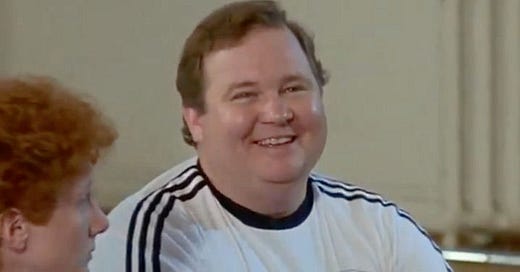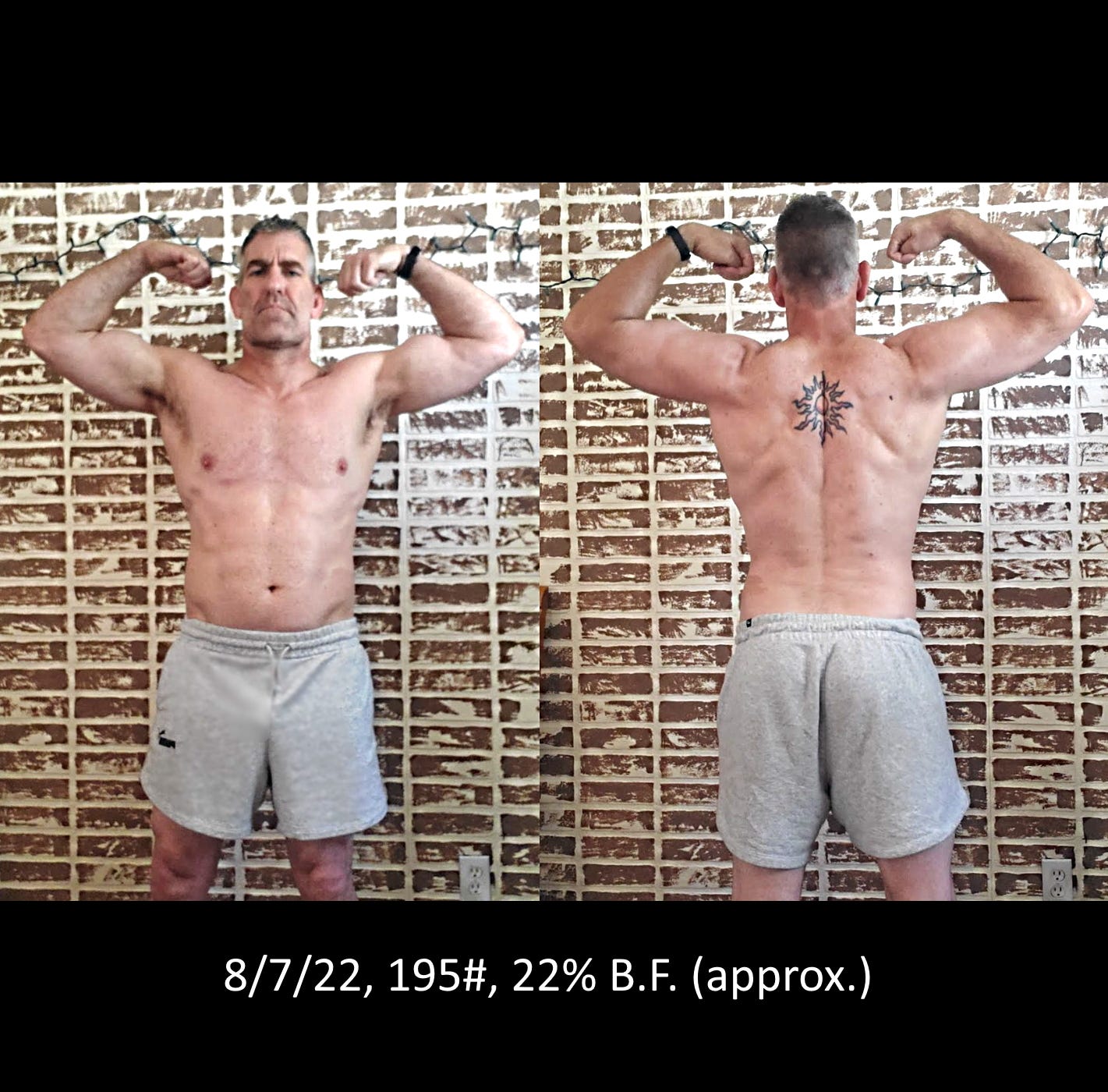The Police Academy Experience Part 2: Physical Fitness Preparation
How fit do you need to be to enter the academy?
Police academies vary considerably from place to place, but all have some aspect of physical training (or “PT” for short.) The idea is to get your ass in shape to effectively fight crime. Most academies have a minimum standard you have to meet to get in to the academy. The academy I’m attending uses what is known as the “Cooper Test”, which was originally developed for the military.
The pre-test we take consists of five “events”, with each one graded by age for superior, excellent, good, fair, poor, or very poor. To get into the academy, you have to average a “poor” or better score on the five events for your age.
Here’s the standards for women.
For a male my age (46), I needed a minimum of:
24 situps in a minute
11 pushups in a minute
An 83 second 300 meter run
A 15:32 mile and a half run
A 14 inch vertical leap
Needless to say, these are VERY modest standards. And, because they use an average, each individual event could be lower if there were corresponding events that were higher.
If you pass the Cooper Test, that becomes your baseline for the remainder of the academy. We’ll do approximately an hour of PT Monday through Friday throughout the 18 weeks of the academy. At the end, you have to have shown improvement to pass.
My Approach and Philosophy
I had about a month between the time I found out I passed the oral board and earned a spot in the academy and the time I had to do the Cooper Test. I wasn’t concerned about the minimum standards because I had been pretty active since February in an attempt to dip my toes into the world of competitive bodybuilding. The pre-test was more of a matter of setting a standard that would be the baseline for the fitness I could gain during the academy’s PT. The idea was simple-
The higher the baseline I set, the harder I’d have to work to improve.
One of my guiding life principles is to never pass up an opportunity to push yourself. Or suffer. So I spent that month training to do well on the Cooper Test. I started adding pushups and situps to my regular lifting routine. I started adding a lot more cardio, specifically running up and down hills at a decently-fast pace. The result? I did pretty well. There were my metrics, with the 99th percentile in parentheses. My goal at the end of the academy is to be in the 99th percentile for each.
42 situps in a minute (47 in a minute)
64 pushups in a minute (64 in a minute)
A 59 second 300 meter run (47 seconds)
An 11:15 mile and a half run (9 minutes, two seconds)
A 22 inch vertical leap (25.1 inches)
None of these benchmarks were close to lifetime personal records, but they were better than anything I’ve done for a decade. The situps should be pretty doable. I’m already at my goal for pushups, so I’ll shoot for 70 in a minute. The 300 meter and 1 1/2 mile run times are within reach; my lifetime PRs in both are close to those times. The vertical leap? I’ve never actually tried to improve this one, so it’ll be a fun experiment.
So why did I want to set a high baseline?
For the last year, I’ve worked closely with the patrol division of my agency. It’s a pretty small agency that covers a huge geographic area, meaning there are a lot of times the response time for backup is really, really long. If the shit hits the fan, you’d better be ready to handle yourself. Or, if you’re not alone, be ready to have the backs of the rest of your crew who are on scene. I don’t ever want to be put in a position where me being out of shape results in someone getting hurt. Especially my crew or the people I’m sworn to serve.
Of course, being physically-prepared for whatever endeavor I was engaging in has been a lifelong habit, whether it was playing football and college in high school running ultramarathons in my late 20’s and early 30’s, or doing jiu jitsu and mma in my late 30’s and early 40’s. Getting and staying fit for this endeavor isn’t much of a stretch.
As I learned in all those endeavors, being physically-prepared is just a matter of setting high standards, then making the right decisions day in and day out over time. The Cooper pre-test set that high standard. Now, when I’m doing the mandatory PT at the academy, I have a reason to work hard each and every day. Because recovery will be important to consistency, I also have a reason to eat the right foods and get enough high-quality sleep.
Wouldn’t it be Smarter to Set a LOW Standard?
I’ve gotten this question a few times. After all, this is a PRE-test, and our performance at the end of the academy will, apparently, be measured by the progress we make. I would look a lot better if I would have half-assed that pre-test. But looking better isn’t the point. BEING better is the point.
Exercise, being what it is, rewards noobs with substantial gains in the first few weeks and months. I’ve long since tapped out that noob potential for all of the Cooper Test events. The only way I’m going to improve is to bust my ass. Even then, the improvements will likely be modest, maybe 10% or less. But the process of earning that 10% will be hella fun. Besides, I owe it to my colleagues to do everything in my power to be in the best possible position to have their backs. And I owe it to my community to be in the best possible position to keep them safe.
How Should YOU Prepare?
Most police academies seem to have pretty modest physical requirements. You’re not training to be a SEAL:
Really, you just need to be in decent shape. Start by understanding the most important principles of exercise. A few months out, start running a few times per week. Hit the gym a few more times per week. Get plenty of sleep and start eating a better diet. Most of all, stay consistent.
To get specific, tailor your preparedness to the specific conditions you’ll face in YOUR academy. Different states may have different requirements, and different academies within each state may have different requirements. Do some Google searching.
The general idea is to train for what you have to perform test-wise. The Cooper test, or some variation of it, is extremely common. Figure out what “events” or exercises you will need to perform, then start doing those. The easiest method? Do the prescribed exercise twice a day, every other day.
If you have a few months and you really want to take fitness seriously (which you should), consider hiring a personal trainer or joining a gym that offers fitness classes. Even Crossfit can be a good idea. If you’re doing the prep alone, start a basic weightlifting program (I recommend the StrongLifts 5X5 program) and start running. For the running part, work on both the aerobic and anaerobic energy systems. Do sprints (or run up and down hills) AND longer, slower runs three days per week. Start light. An easy routine is to do a mile run (at a pace that allows you to easily hold a conversation) followed by four 50 meter sprints (at a pace that’s extremely difficult to hold a conversation.) For the long run, increase it by a quarter of a mile every week. For the sprints, add one each week.
Diet
Diet and exercise go hand-in-hand. Almost all people who go through the academy lose body fat and gain muscle, a process called “body recomposition.” If you’re excessively chubby before the academy, it might be useful to drop a few pounds before you start. You’ll feel better and it’ll help you acclimate to PT faster. And you’ll look better in your uniform.
I’ve already written about diet in this post, which is pretty comprehensive:
My plan doesn’t involve radically altering your lifestyle OR following some dumbass fad diet. Does it work, though? Hell yeah, it does. Here’s the results I got by following these principles over about 15 weeks with the specific goal of gaining muscle while slowly losing body fat:
This is me last week, right before starting the academy:
My goal wasn’t necessarily preparing for the academy; that was a secondary goal. The primary goal was creating a foundation for dipping my toes into the world of competitive bodybuilding. However, the results of that goal have resulted in a pretty good foundation for entering the academy. If you’re interested in the minutia of my diet and exercise routine, I discuss this shit on this Insta account and this Facebook account.
Injuries
Injuries are a big deal in law enforcement. When we train, we want to do everything we can to avoid injuries, whether they’re acute (like a sprained ankle or tweaked back), or chronic (overuse injuries like shin splints or stress fractures.) DURING the academy, getting hurt can get you booted. AFTER the academy, getting hurt can result in being placed on light duty or worse, forced retirement.
I’ve been involved in various sports for decades as a participant and a coach. The number one cause of injuries is overzealous stupidity. People do too much too soon, and they do it too hard. In a perfect world, you start any exercise routine by going light, then slowly increasing the intensity. When you start the academy, though, you’ll be expected to start at a certain degree of intensity. If you’ve been a fat, lazy couch potato, that initial intensity is going push you pretty close to the injury threshold. THIS IS WHY IT IS IMPORTANT TO PHYSICALLY PREPARE BEFORE THE ACADEMY!
Once you actually get to the academy, know your limitations any stay there. The social pressure to push yourself way beyond your limitations can be intense, but don’t be a hero. It’s better to start as the worst person in class and move up the ranks by the end than to push too hard in the first few weeks, get hurt, and have to restart the academy later.
Having said that, if you’re already in decent shape, don’t half-ass workouts. You should always strive to become the best version of yourself possible, and you can always improve fitness. If you’re already near you genetic potential for strength and cardio, improve something else like flexibility or coordination.
Conclusion
That’s it. The physical standards for the academy aren’t rocket surgery. Following well-established principles will get you prepared and carry you through the academy. If you have any questions, shoot me an email to curvyroadproject “at” gmail “dot” com!
~Jason
***






